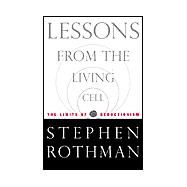
Stephen Rothman, Ph.D., has been an experimental biologist for 40 years. He was a research professor at Harvard Medical School until 1971 when he joined the faculty at the University of California, San Francisco. Best known for his landmark studies of the transport of protein molecules across cell membranes, he has made notable contributions in everything from molecular biology to physiology. Dr. Rothman has published nearly 200 articles in Nature, Science, and other prestigious scientific journals.
| A philosophical call for a new biology from one of its veterans | |
| Reductionism has been an extraordinarily fruitful scientific tradition that has been with us since the Greeks when Democritus first proposed that all matter is made of unseen atoms | |
| It takes as its central tenet the belief that a system can be understood when it is reduced to its most fundamental elements--its constituent parts | |
| In an extreme form, however, this way of looking at nature loses a sense of the whole while arduously squinting at its smallest pieces | |
| As we enter the Genomic Age, many molecular biologists are optimistic that one day we will be able to know "a protozoan or a peacock" through its DNA alone | |
| In this book, experimental biologist Stephen Rothman asserts that such a way of understanding will never be possible and hope that it will is misplaced | |
| He maintains that to oversubscribe to reductionism is to misuse this venerable tradition, to heighten the danger of stifling new ideas and to impede progress | |
| In an elegant and unprecedented examination, Rothman challenges the double-edged sword of reductionism that threatens the scientific method itself | |
| While reductionism remains essential to the scientific process, in its most extreme form, which he dubs strong microreductionism, it can never hope to answer the question | |
| "What makes a system a living?" | |
| With the help of fascinating case studies, Rothman takes a clear-eyed look at the social climate in which science is practiced and explores the collective psychology that he fears is leading scientists down a blind alley, toward a misshapen microscopic view of life and away from its method | |
| Ultimately, he makes an eloquent argument for a Darwinian-inspired approach to biological research that goes beyond reductionism to the whole organism | |
| Rothman sounds an impassioned, philosophical call for a new biologyshy;shy;one that embraces living systems in their transcendent entirety | |
| "In spite of science's noble goals, its remarkable tools, and its access to powerful means of reasoning, humans practice science much like they practice carpentry or politicsshy;shy;as the flawed creatures they are | |
| It is from this perspective that Lessons from the Living Cell takes a critical look at one of the central beliefs of modern science, especially of modern biology, reductionism | |
| As meant here reductionism is a method of inquiry whereby a system is broken down into its constituent parts and studied at as fundamental a level as possible | |
| As we shall see, reductionism has been science's driving force since its emergence, and has been of inestimable, even transcendent, value | |
| It has been far more than a powerful tool | |
| But as with many a good thing, it has been a double-edged sword, with a back edge that is dangerously ragged." | |
| shy;shy;Stephen Rothman In the new Genomic Age, the centuries-old scientific tradition of reductionism has arrived at its "end game." | |
| Genomists hope to know "a protozoan or a peacock" by prying solely into its DNA sequence | |
| Impossible, says experimental biologist | |
| In this elegant and unprecedented examination of standard scientific practice, Rothman sounds an impassioned and philosophical call for a new biologyshy;shy;one that follows in Darwin's footsteps to go beyond the ragged sword of reductionism, toward a method of research that embraces living systems in their entirety | |
| Table of Contents provided by Publisher. All Rights Reserved. |
The New copy of this book will include any supplemental materials advertised. Please check the title of the book to determine if it should include any access cards, study guides, lab manuals, CDs, etc.
The Used, Rental and eBook copies of this book are not guaranteed to include any supplemental materials. Typically, only the book itself is included. This is true even if the title states it includes any access cards, study guides, lab manuals, CDs, etc.